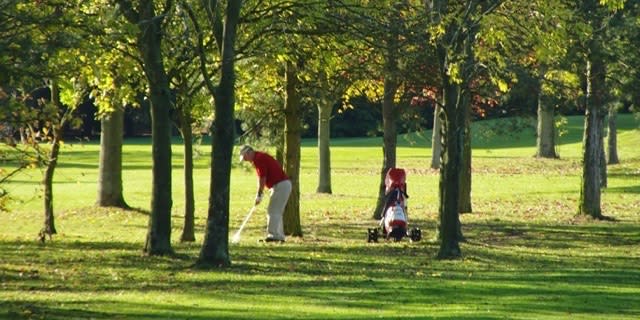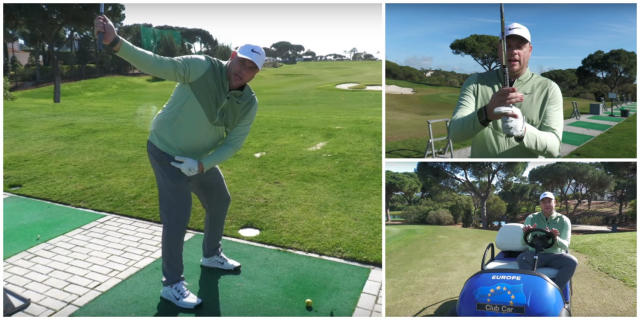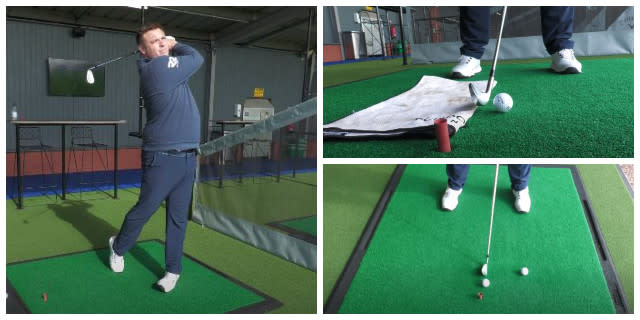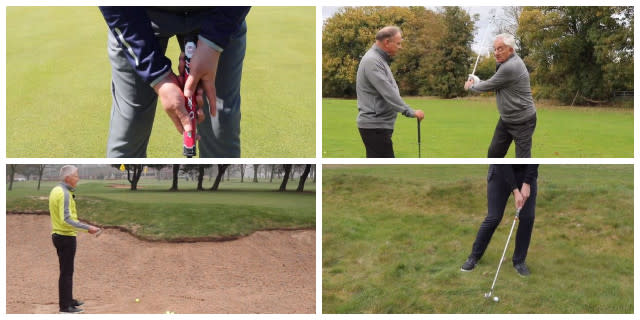Control Behaviors To Play Better Golf
This is the final guest post of a 5 week series from Zen Golf Associate and Golf Performance Psychology Coach John Taylor. John launched his ground-breaking What's in the Bag in 2020 utilising his expertise from the world of NLP, i3 profiling, and Zen Golf.
If you missed the earlier posts from JT you’ll find them here:
- Week 1 - What Is Stopping You Playing Your Best Golf?
- Week 2 - Play Your Own Game And Be Yourself
- Week 3 - Change Your Language To Get a Better Outcome
- Week 4 - Useful Practices - Out With Old in With The New

Don't forget to follow the formula.
C.L.U.B
Character.
Language.
Useful and Unhelpful Practices.
Behaviours and Emotions
The final topic of the series to complete C.L.U.B is: Behaviors and Emotions.
"Golf can be a relaxing stroll or a stressful competition, and a golfer's performance level will change, often dramatically, during a single round. No matter how sophisticated their knowledge about the swing, if golfers don't know how to work with their minds on the course, they are subject to mental obstacles such as performance anxiety, emotional reactions, and distractions."
Dr Joe Parent. Zen Golf: Mastering the Mental Game
JT, "Hi Andy, how's everything coming along? Have you got anything to share with us this week?"
Andy, "Everything is just starting to click and coming along great,I won the comp last Monday with 41 points, and my handicap has come down to 14. I feel I'm playing with more consistency and approaching each game with a bit more composure and clarity. On the first hole last week, I lost a ball and had a nil return on the card. I thought to myself, here we go again. As I walked onto the second tee box, I just said, let's reset, move on. To come in with 41 points and a no show on the card. I was over the moon.”
JT, "Congratulations, this is excellent news; what's changed? Anything in particular, and what is it you can put it down too?"
Andy, "I don't think it's one thing, but after reflection, it's several factors that are contributing. I am not so fixated on the results and playing with more freedom and a relaxed mind. I feel that I am present and living moment by moment. I believe the work I am doing away from golf is having a significant impact on my performance."
JT, "Great to hear you are making progress; keep up the good work. Let's discuss this week's topic, Behaviours and Emotions. How do you deal with your emotions when things are not working?"
Andy," For some reason, I let things build up and allow them to get on top of me. I wouldn't class myself as an angry golfer, but I do blow off steam when I make mistakes. I get frustrated pretty quickly."
JT," It's good to have an emotional release of some kind, but also be mindful of how this can affect you in the future. Eckhart Tolle talks in his book, The Power of NOW, about two ducks fighting on the water; once they finish fighting, both ducks swim away and shake their feathers off. They do this because they are releasing the energy caused by the fight." This seems to allow them to move on without holding on to what has happened. Have you noticed how ducks sometimes swim together after a fight as if nothing has happened?”
JT." Have you looked at the impact it has on yourself and those around you? i.e your playing partners or those close to you, and the overall knock-on effect.”
Andy, "I have not considered the broader impact before and what it can do to my game. But now you mention it. It makes sense that if I hold on to negative emotion, it will cause a downward spiral effect. How do I control my frustration? It’s a problem that I have yet to master."
JT, "When we get upset about specific situations or make mistakes, especially in golf, it's good to step aside and breathe before we attempt our next move. This could mean swinging the club or saying something we might regret. Being able to pause for a second in these moments will support you in making the next decision and allow the thought process to settle."
Andy, "So if I learn to be less reactive and respond differently, it will help manage my emotions?"
JT, " Yes"
JT," Holding on to frustration can and will have a detrimental effect on how you move forward especially carrying it into the next shot. It takes a disciplined mind to learn how to shake things off. Everything we have been talking about over the past 5 weeks, you have to practice. This is no different.”
JT: “There is no right or wrong way to shake off the bad shots and negative self talk, but if we want to get better, we need to consciously work on finding our own way to do this. The first step is simply acknowledging that your inability to fully accept a bad shot and move on completely before the next shot is holding you back.
When you accept that and start working on it yourself, you will eventually see big changes in your scores and your enjoyment levels. You must remember that this is a process, and it isn’t something you are going to master overnight, it is going to take a personal commitment to improvement, and a lot of perseverance to make it actually happen.”
Andy, "I am now starting to see and feel what we have been doing is aligned; when I look at my purpose and definite WHY, it leads to what I am saying to myself, how I practice each part of the CLUB interacts with the other. If I am saying and doing the right thing and being present, my body language will change, helping ease my emotions; therefore, how I act and behave will also change."
JT," You got it. Can you come back and share with the readers how you are putting the CLUB into action. We would love to hear how your season is going.
Andy, "Yes, of course, and thank you for your time; I look forward to our next session, setting intentions and aligning them with my core values.
Emotion is what you feel. ... Frequently, emotions drive behaviour, and too frequently, there is too little thought between the feeling of emotion and action: for example, I'm angry, so I hit a bad shot or lose focus. Behaviour is what you do and is almost always visible to others as it usually involves activity.
What's in the Bag is centered around in-depth personality profiling using i3, self-awareness, and mindfulness. The following article is the first feature in a 4 part weekly series aimed at the average golfer who wants to get more from their golf in relation to both enjoyment and performance.

For more information about What's in the Bag visit: whatsinthebag.club
Related Content:



















